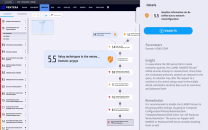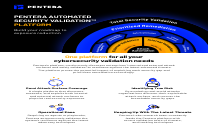
Pentera
Founded Year
2015Stage
Series C | AliveTotal Raised
$185MValuation
$0000Last Raised
$150M | 3 yrs agoMosaic Score The Mosaic Score is an algorithm that measures the overall financial health and market potential of private companies.
-57 points in the past 30 days
About Pentera
Pentera specializes in automated security validation within the cybersecurity industry. The company offers a platform that tests the integrity of cybersecurity layers, identifies security exposures, and assists in remediation to minimize cyber risks. Pentera's solutions cater to a diverse range of sectors, including SMBs and large enterprises. Pentera was formerly known as Pcysys, Ltd. It was founded in 2015 and is based in Petah Tikva, Israel.
Loading...
Pentera's Product Videos


ESPs containing Pentera
The ESP matrix leverages data and analyst insight to identify and rank leading companies in a given technology landscape.
The breach & attack simulation (BAS) market focuses on providing solutions and platforms that simulate real-world cyber attacks and security breaches to assess the effectiveness of an organization's security defenses. Vendors in this market offer organizations a proactive approach to identifying and remediating cybersecurity gaps, reducing the risk of a breach. Traditional security control validat…
Pentera named as Outperformer among 15 other companies, including Fortinet, Akamai, and Palo Alto Networks.
Pentera's Products & Differentiators
Pentera platform
Pentera’s platform continuously discovers enterprises’ internal and external attack surfaces and safely validates its readiness against the latest advanced threats. Through automated testing of security gaps to create full attack chains, the platform proves the potential real-life impact of exploiting each vulnerability and prioritizes remediation accordingly.
Loading...
Expert Collections containing Pentera
Expert Collections are analyst-curated lists that highlight the companies you need to know in the most important technology spaces.
Pentera is included in 2 Expert Collections, including Unicorns- Billion Dollar Startups.
Unicorns- Billion Dollar Startups
1,257 items
Cybersecurity
10,243 items
These companies protect organizations from digital threats.
Latest Pentera News
Jan 2, 2025
"Founders who prioritize the company's success over ego and image, trusting a professional CEO to lead while focusing on the technological and product core, can greatly enhance their company's performance," writes Dr. Arik Liberzon, founder and CTO of Pentera. Dr. Arik Liberzon In recent years, achieving success in the tech industry and raising funds has become a lot tougher. With the strength of our tech industry tied to the overall economy, these challenges have been compounded by a few major events - from the fallout of COVID-19 to the judicial overhaul, and most recently, the ongoing war. Startup founders are grappling with new hurdles at every turn in a tech landscape where the minimum barriers have risen. Raising money, attracting talent, product development and innovation, and go-to-market success have all undoubtedly become much more difficult. For aspiring tech-founders out there, I wanted to highlight a path less explored, but one that has proven successful in my life. Instead of ego driving me to remain atop the business hierarchy and retain the CEO title, I decided to partner with a professional CEO as a partner so that I could focus on my passion: The technology and product that were the driving forces behind the company. (Photo: Pentera ) My approach is considered unconventional, and few tech founders choose it. Yet, from my personal experience, I’ve learned that the decision provides significant advantages, and can propel the company forward. When I began my tech journey and founded Pentera (at the time Pcysys), I was a one-person operational management team. I handled every aspect of the company, including fundraising, hiring, technology research, and product leadership. The situation is unusual in the tech world, where we typically see a small group of active founders (most often two or three) juggle the tasks and processes between them. In cybersecurity it’s usually three tech experts from the same army unit who each choose a different C-Suite title. About two years into the Pentera journey we reached a critical crossroads, and I had to make a decision. The company was on an upwards trajectory; we had just completed our second funding round, and were primed for expansion. We could afford to scale the team, but it quickly became clear that I could not continue doing everything by myself at the top. The choice I had to make was which part to focus on personally and where to bring someone in. Do I take on the role of CEO and lead the business of Pentera, or the technology and product development as Chief Technology Officer (CTO)? I chose to remain loyal to the vision that initially drove me—the passion for technology, innovation, and creating a groundbreaking product. At that critical crossroad, I decided to put my trust in Amitai Ratzon, a seasoned and experienced sales professional, who stepped into the role of CEO for the company, so that I could stay close to the technology. After almost seven years, I can say that that decision has proven wise, and taught me an important lesson, one I encourage startup founders around me to consider. The foundation and driving force behind the success of your company is the technology and product you’re building; so that's where you should be - as close to product innovation, technological vision, and its daily realization as you can be. In the early days, when I pitched investors and cybersecurity professionals about the idea of an automated penetration testing platform, many doubted whether manual testing could ever be replaced. They thought there were too many variables and that automation couldn’t work here. I was confident in the vision, but there were moments when I struggled to believe I would find partners to realize the vision. However, once I did find the right business partners, the technology and product proved to be the foundations from which all other successes flowed. I believe that trying to take the opposite approach - building a product based on the business would be the more challenging path. When a founder is entrenched in the technology and the product, it becomes easier to attract quality employees. This is a matter of language. The founder lives and breathes the technical aspects of the product he conceived and developed, speaking the same language as developers, researchers, and technical experts the company aims to hire. When candidates meet a founder who is deeply invested in the organization's technological domain, it gives them the confidence to join. Related articles:
Pentera Frequently Asked Questions (FAQ)
When was Pentera founded?
Pentera was founded in 2015.
Where is Pentera's headquarters?
Pentera's headquarters is located at Em Ha’Moshavot 94, Petah Tikva.
What is Pentera's latest funding round?
Pentera's latest funding round is Series C.
How much did Pentera raise?
Pentera raised a total of $185M.
Who are the investors of Pentera?
Investors of Pentera include AWZ Ventures, Blackstone, Insight Partners, K1 Capital Management, Evolution Equity Partners and 3 more.
Who are Pentera's competitors?
Competitors of Pentera include Saporo, Horizon3.ai, SCYTHE, Synack, Bishop Fox and 7 more.
What products does Pentera offer?
Pentera's products include Pentera platform.
Who are Pentera's customers?
Customers of Pentera include Sandler Capital Management and BDO Singapore.
Loading...
Compare Pentera to Competitors

Cymulate operates within the security validation domain, offering a platform for security validation, tools for breach and attack simulation, continuous red teaming, and exposure analytics to help organizations identify and address vulnerabilities. The solutions challenge and optimize cybersecurity measures across various sectors, including enterprise IT and managed security services. It was founded in 2016 and is based in Tel Aviv, Israel.

CyCognito specializes in cybersecurity, focusing on exposure management and attack surface management. The company offers a platform that enables organizations to discover, test, and prioritize their web assets and applications to mitigate security risks. CyCognito primarily serves large enterprises and Fortune 500 companies across various sectors with their cybersecurity needs. It was founded in 2017 and is based in Palo Alto, California.

AttackIQ specializes in breach and attack simulation products for security control validation within the cybersecurity industry. The company emulates adversary tactics, techniques, and procedures, aligning with the MITRE ATT&CK framework, to provide insights into security program performance and offer data-driven analysis and mitigation guidance. AttackIQ's solutions cater to various sectors, including energy, financial services, healthcare, and federal organizations. It was founded in 2013 and is based in Los Altos, California.

Bugcrowd operates as a crowdsourced cybersecurity company that focuses on identifying and mitigating digital threats. The company offers a range of services, including penetration testing, vulnerability disclosure, and attack surface management, all designed to help organizations protect their digital assets. Its platform leverages a global community of security researchers and AI-powered tools to provide security testing and actionable insights. It was founded in 2012 and is based in San Francisco, California.

HackerOne is a cybersecurity company that specializes in ethical hacking and vulnerability coordination. The company offers a platform for vulnerability disclosure, bug bounty programs, and other security services to identify and address security flaws. HackerOne's solutions cater to various sectors, including financial services, government, healthcare, and transportation. It was founded in 2012 and is based in San Francisco, California.

Bishop Fox provides services in offensive security, including penetration testing, red teaming, and attack surface management, alongside assessments for application, cloud, and network security. The company serves sectors such as technology companies and enterprises with sensitive data and systems. It was founded in 2005 and is based in Tempe, Arizona.
Loading...